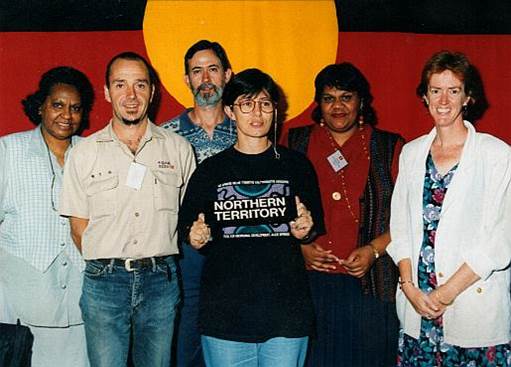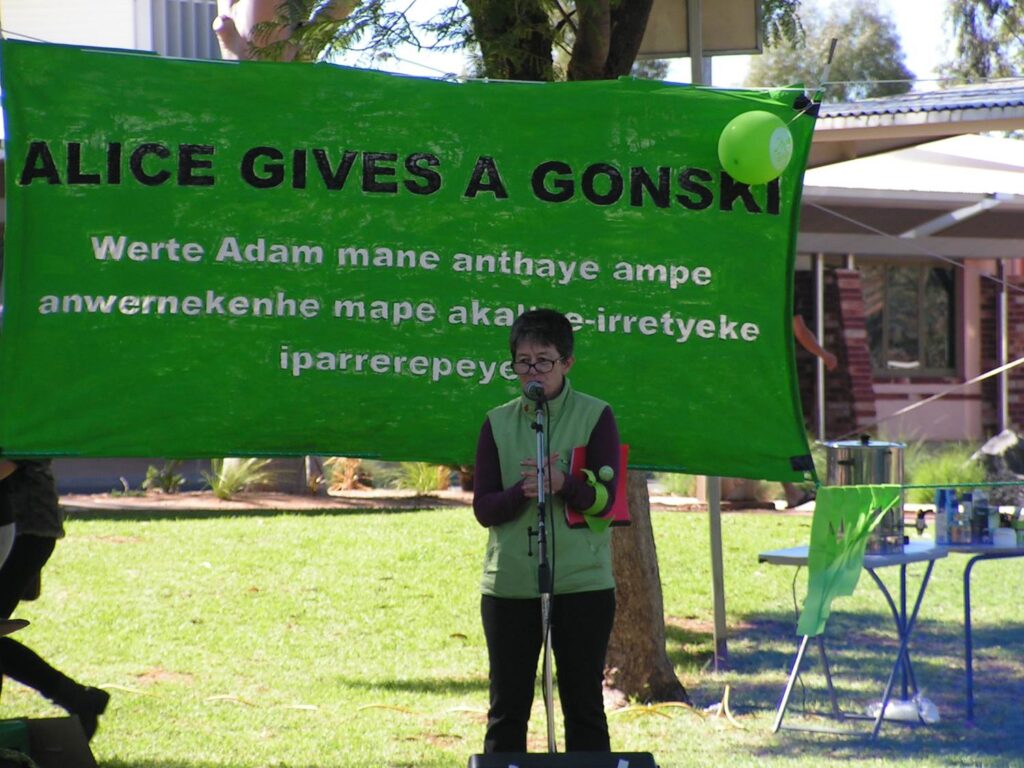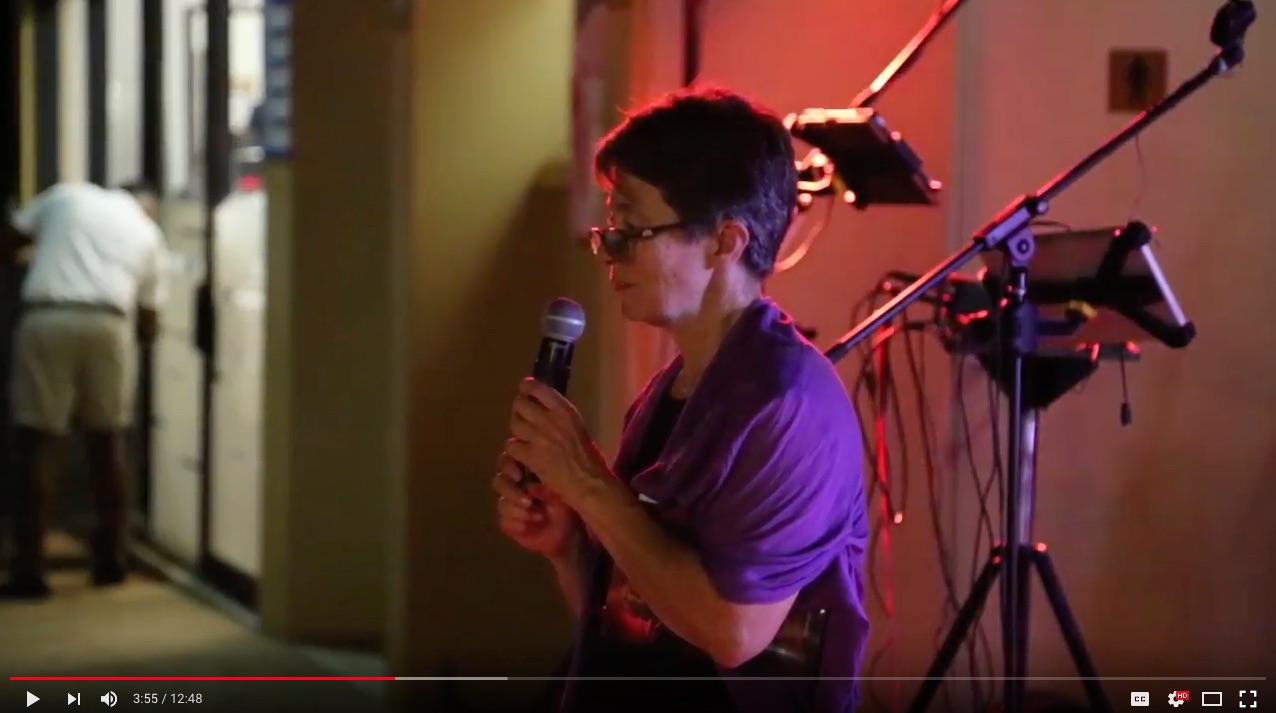Former Branch President Nadine Williams has retired from her work as a union official. This is her final report, presented to our 2016 annual conference
The Organiser position in the AEU in the NT is a position I held for a period of five years. It is continuously both demanding and rewarding as members of the union work to build the union and I am glad to have been a part of that process.
My report for this Conference will be my last official paper and I want to begin by thanking you all as delegates and members with full time teaching and other responsibilities for being strong members of our NT Branch and of the national union. Sticking up for other workers in your workplace is one thing, but your presence at conference shows the extent of your commitment goes beyond that to encompass the campaigns, the strategic placement of our union with the fights ahead of us and the intelligent drive to make changes for the better in public education.
In 2008 the AEU NT put out a bumper sticker for our Enterprise Bargaining campaign; it read: TEACHERS ON THE FRONTLINE – FIGHTING FOR QUALITY EDUCATION
Our current situation as an essential service is much more precarious in 2016 as we have now had three years and more of cuts to the basic budget for education in government schools. Staff cuts are not balanced by or made less damaging to the capacity of our spider web of small remote schools and larger schools in regional centres and Palmerston with classrooms overcrowded and teachers stretched; we all face a barrage of cuts that no bucket load of recent infrastructure promises and sod-turning can make up for when a single teacher has 28 students in a Year 1 class, or 25 in a Year 12 English class. We have to fight for the resources that make a quality education possible – and we are.
A lot of the workload of the Organiser is dealing with the harm of these cuts; increasing numbers of our membership requiring psychological counselling and medical leave for stress in the past three years. Bullying and intimidation, threats against staff not to “go to the union” and constant picking on the senior elders in our profession to “retire or resign”, has become normalised. This is unacceptable and it cannot continue; I believe members are angry about this, not unreasonably.
As a union we can collectively take on the bullies and bureaucrats who hide behind government rhetoric. The strength of our union is our capacity to present arguments and form alliances (with COGSO, with professional associations, with our university colleagues) and fight for full funding for our schools and our communities.
I have conducted training with as many members in small or large groups as I can when I am visiting workplaces over the past year, and in every location, from small two teacher schools to senior colleges, all are in step with the main issues, those being workloads, security of jobs, global school budgets, reduction in support services, and no time to build resilience to the constant changes to everything from reporting requirements, NAPLAN, performance management, conditions of employment and a lot of students who have severe or moderate needs that cannot be met. With our age demographic still rising in the teaching service, and turnover of young new recruits we may just want to see what happens next.
The elections both federal and local that are upon us now do provide us with the opportunity to get out and be loud and proud of our union’s position on Gonski funding and our own specific locality issues. Voting is not just compulsory in Australia, it’s a time to get our legitimate and clearly articulated arguments about deficit funding of our public schools into the open.
I have seen also in the past year an increasingly cavalier attitude to health and safety in schools and smugness about the way the Department of Education, the Government housing authorities for remote schools regard the legal obligation to adhere to the Work Health and Safety Act and regulations. This area – which also includes the unacceptable extent of psycho-social injuries to educators – is our responsibility as a union. We can and must use it as the platform for more active and vocal campaigns on safety at work.

Safe Schools
The work of the Safe Schools Coalitions and recent attacks on it by conservatives in the federal parliament have not stopped the fine work and excellent resources from being available to schools in NT. It is great to hear that the NT has agreed to a provider of the school training for staff, yet we all can assist in spreading the news about the benefits of any school in any location supporting safe learning environments for all in our schools who are gender diverse, trans or just questioning by forming the nucleus from the union members in a workplace to put to school councils that OUR school is a Safe School.
I have made over 100 visits to schools in the past year, some just for one member, others for sub-branch meetings and to meet with principals about grievances, procedures and sometimes to celebrate events. I have attended Alice Springs and Barkly Regional Council meetings and held meetings in staff rooms, homes and roadhouses to reach some of our most remote Central Australian members. The AEU NT is known in some remote communities for the prizes given at school carnivals or expos – these events help to show the union as a force for positive outcomes for students and staff, and the acknowledgement I know of from community members is a big help in growing understanding of unions.
The Department of Education senior officers in Central Australia have invited me to attend and be accessible to all principals in the past two years especially at the principals’ conferences. This has allowed for informal and formal contact with all principals and to keep up with the changes and expectations.
In 2014 and 2015 I was on the Enterprise Bargaining team with other unions for the Batchelor Institute agreement. It was one of the longest bargaining rounds I have been in, but finally ended successfully with Fair Work approving the agreement. Attached to this was the “transfer of business” for a small group of members from the Prison Educators in both Alice Springs and Darwin prisons. They now come under the Batchelor Institute management and are delivering prison education courses for job readiness on release. We have grown our membership in this sector, and while it is still very small, it is significant that we are covering all of the new appointments to the prison program and have established relationships with management and staff.
I am leaving the position of Organiser in June this year, and would like to thank the Executive members and especially the Vice President Stephen Pelizzo for ongoing support over the five years I have held this position. I also want to thank Jarvis Ryan and Anita Jonsberg as the full time officers who have taken on the roles of president and secretary at a time of change and some turmoil in our union and acknowledge their professionalism and courage in dealing with the NT Government and representing our branch in the federal arena.
I recall the “frontline” stance we took in past bargaining campaigns and wish all members the best, especially the dedicated delegates and office bearers in schools and the regions who work for our union on top of their full time jobs as educators.
In unity
FIGHTING FOR QUALITY EDUCATION – OUR STUDENTS ARE WORTH IT
Nadine Williams
17 May 2016


